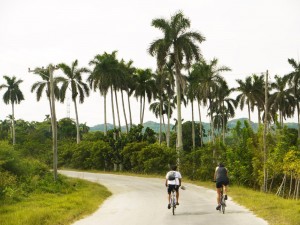
Although only an act of Congress will dissolve the embargo completely, U.S. President Barack Obama has effectively lifted some of the restrictions that directly affected travel to Cuba. Americans wanting to visit Cuba still have to meet criteria to fit into one of twelve categories and file the appropriate paperwork, but it will be much easier going forward for U.S.-based operators to offer opportunities for travelers to see Cuba. Americans can’t just hop on a flight to Havana for a personal vacation, but if they are greenlighted to go on an approved group trip, they can now use U.S.-based credit and debit cards and they can bring back a Cuban cigar or two (up to $100 worth).
“100% of the travel industry people I’ve spoken with about Cuba agree on one prediction -- travel to Cuba will explode,” says ATTA President Shannon Stowell. “But there’s another point of agreement -- travel professionals are worried about the potential damaging impacts of that explosion.” Stowell says he recognizes how complicated the issue is. “Cubans need the income that tourists can provide but how can it be managed so that exploitative companies and characters don’t dominate? I hope that the culture of Cuba can be kept as intact as well as its natural capital but I fear a future that includes mass tourism.”

With no luxury infrastructure, unreliable internet connectivity and a focus on cultural attractions (think music, dance and folklore), it seems likely that travel to Cuba could inherently skew toward adventure -- at least until the infrastructure can support mass tourism. And because travelers to Cuba can’t show up on their own without an itinerary, they’ll still need to book with an operator -- we’re hoping that adventure operators will be the most attractive option for Americans eager to explore the island.
How will adventure travel fare against mass travel during this opportunity? The ATTA reached out to its tour operator members and the adventure travel community to find out what could happen as we cross over this important threshold. Here’s what they have to say:
“As a Canadian company, we've been operating adventure trips in Cuba for the past three years. The positives for the Cubans are that there will be more jobs created, however the country will no doubt change with the increased demand, which will likely lead to a loss of the authenticity of Cuba. What will be important will be to manage the expectations of the traveler. People can not come to Cuba and expect it to be what other countries are. Cuba is a very poor country and many things are scarce including fresh water. Guides are government employees. Most of the hotels are suffering from a lack of quality maintenance that just is not generally available in Cuba because they cannot bring the supplies into the country. Of course all of this can change with the lifting of the embargo, but travelers have to be aware that this is the way that things are in Cuba.”-- Trish Sare, BikeHike Adventures
“International Expeditions is working hard to define programming that lays a sustainable foundation for Cuban’s in local communities, especially in the biological zones which are so fragile and must be protected. We hope companies like ours will move into Cuba with a cross cultural mission to preserve the integrity of the environment and set a precedence for developers to take caution in how development should take place. Though it is the largest island in the Caribbean, Cuba is as fragile as any other small unconnected land mass. Cuba’s size and topography support a very unique diversity of flora and fauna. The country’s varied ecological zones--from coastal swamps to sizable mountain ranges work as one contiguous island ecosystem, which is today relatively healthy. We hope to share with American travelers Cuba’s wonderful array of natural attractions for a long time to come, a hope that is dependent on measured development controlled by leaders who understand the long-term impact of over-development, and by local people who recognize that many come to see the real Cuba and its natural treasures.”-- Emily Harley, International Expeditions
“Hopefully the new regulations will make it easier for small businesses to obtain a license, something that so far has favored the bigger players that are actually offering fancy sight-seeing trips. Regardless of how this plays out for my business and the travel industry, it is the right thing for the Cuban people and I hope this will give them the energy to move into the direction they chose.”-- Alice Kupcik, Salsa Retreat
“As one of the first companies to offer trips a few years back under the revised People to People programs we saw it from the inside. These changes are long over due and will do more to help the Cuban people that one can properly articulate here. One has to remember tourism isn’t new to Cuba. In fact, it is reported that over 3 million international visitors visit the country yearly. Canadians figured out how amazing the country is years ago and have been flocking to low-cost, all-inclusive beach resorts for decades. That said, the infrastructure is already taxed. The good news is these changes will take time to roll out and as pointed out, we can only hope solid sustainable practices will be embraced.”-- Dan Austin, Austin Adventures
“When I was in Cuba in 2001 one of my connections there pointed out which buildings Burger King had already ‘pre-leased’ (for lack of better term). So, whatever we do, it needs to be done quick-like! Tourism can offer a chance to create a lot of new jobs. I met a man who was a professor who left his tenured teaching position to put chairs on/off the beach at a tourist resort, because he made way more money that way. The people in the service industry were making more than the professionals, and it really disrupted the social-economic balance. I would love to see a way for the common person there to benefit by tourism and jobs in this industry.”-- Kristen Gill, Kristen Gill Media
“I have been working and personally traveling to Cuba since 1991. I would argue that Cuba has both sustainable and ‘mass’ tourism already. It is estimated that 1.8 million U.S. residents will travel to Cuba in the next 2 years. Thus we can expect both ‘good’ or high-valued travelers and well those only interested in fun in the sun or resort tourists that leave very little economically in the local communities.”-- Malia Everette, Altruvistas
“I did my first trip to Cuba 20 years ago and have traveled, hiked, dived, sailed much of the island from Maria La Gorda in the west to Trinidad in south to Santiago in east. This is hands down the best destination in the Caribbean and it's about time the US joined the rest of the world in visiting Cuba.”-- Eric Hiss, Travel Writer
“Almost every single traveler I encountered in Cuba a few years ago had the same comment -- they wanted to see and experience Cuba before it was opened up to the USA and becomes ‘Americanized’. I feel this is a real and justified fear. Hopefully, this conversation will also address specifically the pitfalls of mass tourism and large-ship cruises.”-- Joe Staiano, Meaningful Trip
